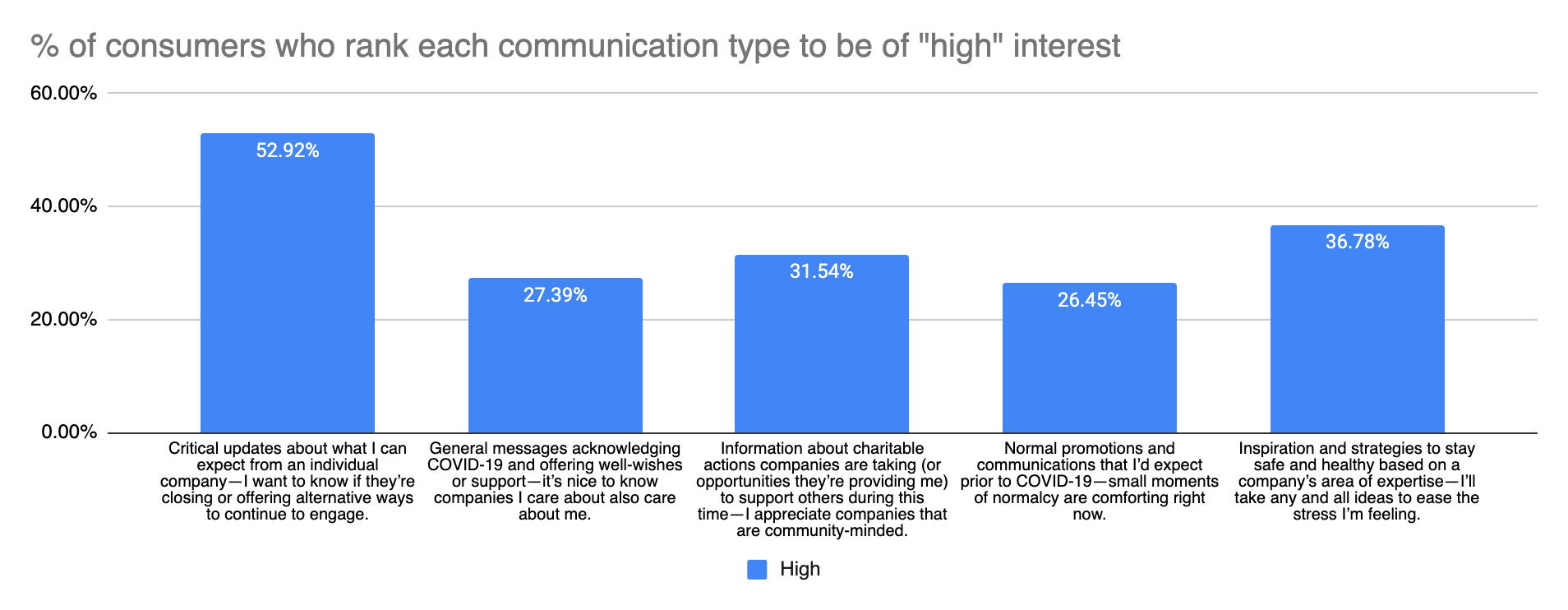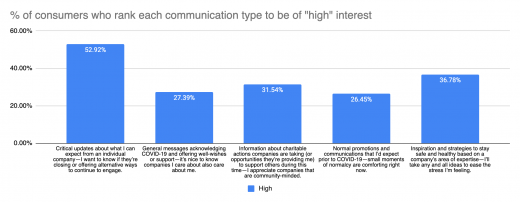Authentic communication is more important than ever in the age of coronavirus
Don’t do something because everyone else is – make sure it has purpose and meaning because your customers need honesty and transparency like never before.
There is no precedent for what we are all going through. There is no playbook for how to keep businesses operating while ongoing shelter in place orders turn workers into remote employees – if they’re lucky. The company I work for held its first 100% virtual all-hands meeting. It was a sobering moment that gave me, and I imagine scores of my colleagues, pause as we watched our executives speak compassionately, frankly and with incredibly humbling vulnerability from their own homes.
But all that aside, there’s no handbook or manual for the new family dynamics and interpersonal interactions that dot the evolving social media landscape: just look at the various family, friend and coworker virtual happy hours that have popped up on Zoom, FaceTime and other video applications. Many of us have had to become a remote employee, a child care provider, and a teacher overnight. There is no map for navigating our new normal – there’s only patience, understanding and the fact that we have an abundance of tools at our disposal to solve seemingly bewildering challenges.
The digital world has enabled us to retain some form of connective tissue with the people in our lives. And those same digital communication mechanisms have stimulated an avalanche of COVID-related emails (by some estimates 1 in 15 emails are COVID related) from everyone you have ever done business with or given your email address to as part of the personal data exchange we call e-commerce on the internet. At the same time COVID related spam has grown 14,000% in a matter of weeks.
If marketers thought they had an uphill slog for attention and clicks in the inbox, that hill is now thrice as steep and ten times slippier because context and awareness have taken on a new level of importance in everything we say and send to our customers.
Why are you sending that COVID email?
If your answer is because everyone else is doing it, and it affords you an opportunity to talk to your customers, you should take your foot off the accelerator, apply the brake, come to a complete and total standstill, get out of the vehicle and throw your car key into the nearest body of water.
Catastrophe alone is insufficient to communicate on topics where you lack expertise, or where your brand really has no business being. Let’s consider the following: you run a brick and mortar store that is now closed because it’s non-essential. A message notifying customers that your stores are closed is appropriate. Informing them that online sales will continue and you will take precautions to maintain a safe warehouse/shipping environment, but that orders will take longer to deliver is also completely appropriate. Advising customers on how they can keep safe, outside of referring to official guidelines such as those provided by the CDC or the WHO, is not only inappropriate, it is dangerous and will inevitably backfire. And then there’s the other kind of approach: The one where you have no reason to send an email, you just opportunistically decided that it was a good time to sound concerned.
Brands have been “in the age of authenticity” for more than a decade now. A hashtag can go viral in a matter of days, if not hours, and there have been numerous brands that have paid the price for being tone-deaf to social uproars and their own misdirected advertisements. Now is not the time to do things because they seem like a good idea. I’ll say it again, now is not that time.
However, not all is doom and gloom: Messages with inspiration and strategies to stay safe were ranked of high interest by 37% of consumers, particularly when those recommendations grounded in the company’s particular area of expertise according to new research by Twilio.

Where you say it is as important as what you say
Equally important is understanding channel preferences. Twilio’s recent Global Consumer Engagement study found that 83% of consumers prefer companies to communicate with them via email. However, in that same study, consumers were 2.5x as likely to prefer text messaging over email when communications are urgent. The trick is understanding urgency and ensuring it’s aligned with the appropriate channel. Remember that what may seem of utmost urgency to you and your business may not be to your customers. If you’re not operating an essential business then you may want to forego SMS and focus on building visually rich and brutally honest communications in an email that are:
- Authentic and in your brand’s most empathic voice
- Timely insofar as they are sent during normal business hours and won’t wake people up who may be having difficulty sleeping as it is
- Informative without ignoring what is happening
- Setting expectations around product availability and delivery windows
- And ultimately, as human as you can make them.
Don’t settle for less
However you decide to position your communications, keep in mind that this is not the time for clever or veiled sales pitches. The world is moving in a direction that none of us ever imagined. People are scared – anxiety levels are creating a communal reservoir so deep that it could drown the empire state building. Now is the time for our humanity and our honesty to be our north star, and the metric by which we measure our own presence and purpose in the marketplace.
Don’t settle for good enough – don’t settle for simply doing something because everyone else is – make sure what you do has purpose and meaning because your customers need a measure of honesty and transparency like never before. No one knows when the new normal will once again resemble the old normal. Like the rest of you, I’m desperate to return to the old normal, the one that’s familiar and free of novel pathogens. I’m hopeful that time will come sooner rather than later. What we do between now and then will define our businesses and the kind of world we will have when this too passes. I hope that you and your family are healthy, safe and remain that way. With a measure of luck, a lot of soap and as much collective goodness as we can muster, we will get through this together.
Opinions expressed in this article are those of the guest author and not necessarily Marketing Land. Staff authors are listed here.
Marketing Land – Internet Marketing News, Strategies & Tips
(8)



